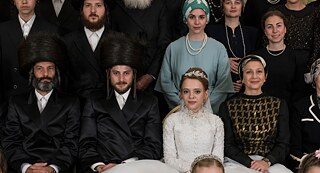German Series in Canada
Unorthodox - Escaping to a new life

The four-part “Unorthodox” (Netflix) not only tells the stirring tale of a young woman’s escape from New York to Berlin. Made by the same people who brought us “Deutschland 83”, and celebrated by TV fans and critics alike, it also offers a fascinating insight into the parallel universe that is an ultra-orthodox Jewish community, where life is cut off from the rest of the world.
By Angela Zierow
God expected too much from me. Now I have to find my own way.
"Esty" in Unorthodox
A mini-series from Netflix, “Unorthodox” addresses a subject that is as complex as it is potentially explosive. The drama is based on the autobiographical bestseller “Unorthodox: The Scandalous Rejection of My Hasidic Roots” (Simon and Schuster, 2012), in which New York-born Deborah Feldman recounts how she broke with the Hasidic Satmar community in Brooklyn. Born in 1986, Feldman had turned her back on her ultra-orthodox Jewish family shortly after her 23rd birthday to enable her young son to live an independent life. Both now live in Berlin.
“Unorthodox” uses flashbacks to reveal Esty’s backstory and her family’s past – her grandmother was forced to flee from her Hungarian homeland to escape Hitler’s Nazi henchmen and never managed to get over this or the murder of her relatives; her father was addicted to drink, and Esty’s biological mother is an outcast because she dared to cut her ties with the religious community in a bid to lead an independent life – in Germany of all places. For a long time, Esty despises her for this decision, believing her to be a bad mother, though suppressing the fact that she too rebels increasingly often against the rigid conventions that dictate her everyday existence and even her private life. A young woman thirsty for knowledge, she soon finds herself neither willing nor able to accept her fate as a wife whose job it is to have children. So her only option is to seek refuge with the mother she doesn’t know.


On the road there is a different Torah
"Moishe" in Unorthodox
“Unorthodox“ has the viewer riveted right from the very first scene – not least thanks to the outstanding Shira Haas (“Nobel Savage”). A star of cinema and series back home in Israel, Haas describes Esty as “probably the most complex character I’ve ever played”. A heart-rending performance is likewise given by Haas’ Israeli colleague Amit Rahav, who plays Esty’s soul-searching husband Yanky. Israeli-German actor Jeff Wilbusch’s portrayal of Yanky’s cousin Moishe, a man torn between his religious beliefs and his addictions, is all too realistic; perhaps this is because of the past that Wilbusch associates with “Unorthodox”. Known in Germany from the hit series “Bad Banks”, the actor grew up in an ultra-orthodox Haredi community in Mea Shearim (Jerusalem) that he left at the age of 13 to head for Amsterdam.
The highly-successful producer and author Anna Winger (whose works include “Deutschland 83”, “Deutschland 86”, and “Deutschland 89”) and her co-author Alexa Karolinski are behind this internationally-acclaimed series. It was directed by the actress and filmmaker Maria Schrader (“Stefan Zweig: Farewell to Europe”), who also starred in Winger’s “Deutschland” trilogy. Not least because the series was filmed to a large extent in Yiddish, most of the actors that appear in it are Jewish. “We wanted people who either speak or are familiar with the language”, said Producer Winger to Variety magazine. What is more, she explains, there are numerous film and television projects featuring Jewish stories that involved not a single Jew either behind or in front of the camera. “We felt it was important to change this”, says Winger.


Netflix Original "Unorthodox"; 4 episodes @ 53 - 55 minutes.
The four-part German original mini series, written by Anna Winger and Alexa Karolinski, is inspired by Deborah Feldman's bestseller of the same name.
Directed by Maria Schrader. Shira Haas, Jeff Wilbusch and Amit Rahav play the main roles.
Unorthodox was shot in Yiddish and English and has been running exclusively and worldwide on Netflix since March 2020.
